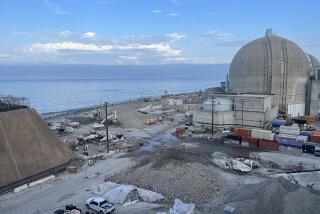Demolition of nuclear tower symbolic for N. Korea, U.S.
- Share via
BEIJING — With a flash of explosives, North Korea on Friday demolished the cooling tower for its main nuclear reactor, the concrete shell vanishing into a cloud of smoke and dust aimed at showing that the authoritarian country is sincere about dismantling its nuclear weapons program.
Televising the demolition of the conical 60-foot-tall tower had been suggested by North Korea, whose leader, Kim Jong Il, is a cinema buff famous for his flare for the theatrical. It came a day after President Bush met a North Korean declaration about its nuclear program with an announcement that he would remove the Pyongyang government from the State Department’s list of terrorism sponsors and lift other sanctions.
The demolition also provided Bush with dramatic, if largely symbolic, imagery he hopes will vindicate his administration’s policies on confronting countries possessing weapons of mass destruction.
“It is a visual thing,” said Daniel Pinkston, a Seoul-based senior analyst with the International Crisis Group, a think tank. “People get excited when they watch things blow up or fireworks, but the North Koreans are good with concrete.”
Pinkston said that the cooling tower was basically a concrete chimney that could be rebuilt in a month, but that other facilities at the Yongbyon nuclear compound would take at least 18 months to restore. The North Koreans have shut down a plant that made fuel rods for its 5-megawatt reactor as well as a reprocessing plant that extracted weapons-grade plutonium from spent rods.
Secretary of State Condoleezza Rice, speaking in Japan, where she was attending a meeting of officials from the Group of 8 industrial nations, said the demolition was a small part of the process of nuclear dismantlement.
“That will not be the end of the story,” Rice said. “We also must deal with proliferation. We must deal with highly enriched uranium. We must verifiably end all of North Korea’s programs.”
The controlled implosion took place at 5 p.m. local time, 20 hours after Bush announced the easing of sanctions at the White House. A small crowd gathered on a hillside at Yongbyon, a Soviet-era nuclear compound in the mountains 60 miles north of Pyongyang.
Video showed a puff emerging from the tower, then orange flame shooting out from the base. After a loud bang, the structure collapsed, enveloped by brown smoke.
Ri Yong Ho, North Korea’s director of safeguards at the facility, shook hands with U.S. State Department envoy Sung Kim, who was there to witness the demolition. Ri told reporters that it was “a significant contribution to peace for the whole world.”
North Korea and the United States are following what diplomats call “action for action,” a series of reciprocal concessions. On Thursday, North Korea submitted a 60-page report detailing the scope of its nuclear program, a step that the Bush administration had demanded as a prerequisite for removing the terrorism sponsor designation.
According to analysts familiar with the nuclear program, Pyongyang was likely to admit having a stockpile of about 90 pounds of weapons-grade plutonium, which it has produced at Yongbyon since 1986. The plutonium is enough for six or seven nuclear bombs.
However, under a controversial compromise struck by the Bush administration, Pyongyang was allowed to omit detailed information about a nuclear test it conducted in October 2006 and about how many nuclear bombs it has built. The documents do not cover allegations by the Bush administration about a secretive nuclear program that uses highly enriched uranium, an alternative to plutonium for bomb making.
In 2002, Bush used evidence of that uranium program as his justification for breaking a denuclearization deal struck by the Clinton administration. Bush’s critics -- both hard-liners and those who have urged negotiations with North Korea -- contend that the administration’s approach impeded progress on denuclearization for six years, during which Kim’s regime processed weapons-grade plutonium and exploded a small nuclear bomb.
Chuck Downs, a Washington-based Korea expert who is an outspoken critic of Kim’s regime, believes that the deal Bush is negotiating will fall apart by the end of the administration’s term.
“The North Koreans will find a pretext to break up the negotiations,” Downs said. “They’ll say that even though they knocked down the cooling tower, the United States still has a hostile policy.
“Then they’ll try to lure the next administration . . . into another negotiating cycle,” he said. “This is the standard North Korea playbook for negotiations and there is no reason to believe it has changed.”
--
More to Read
Sign up for Essential California
The most important California stories and recommendations in your inbox every morning.
You may occasionally receive promotional content from the Los Angeles Times.










